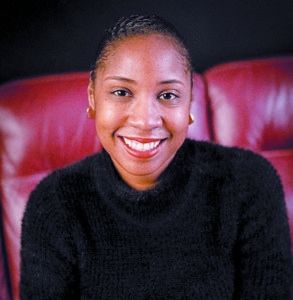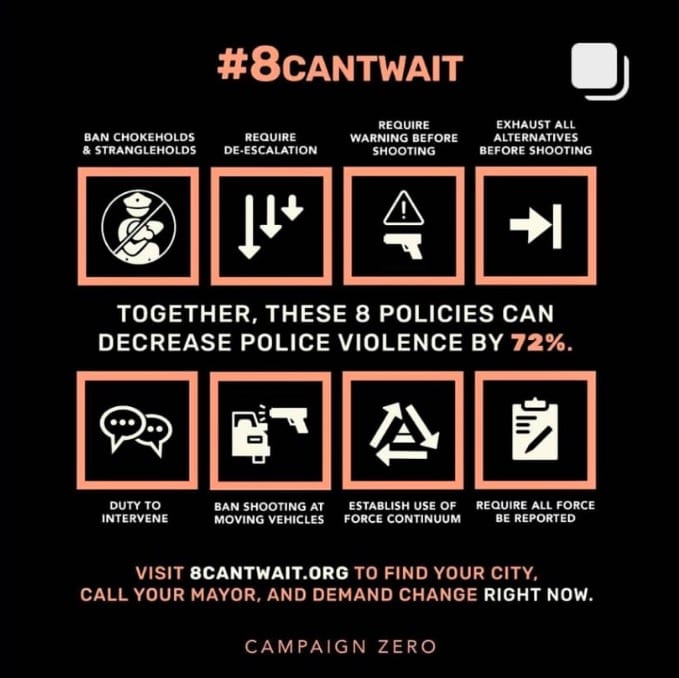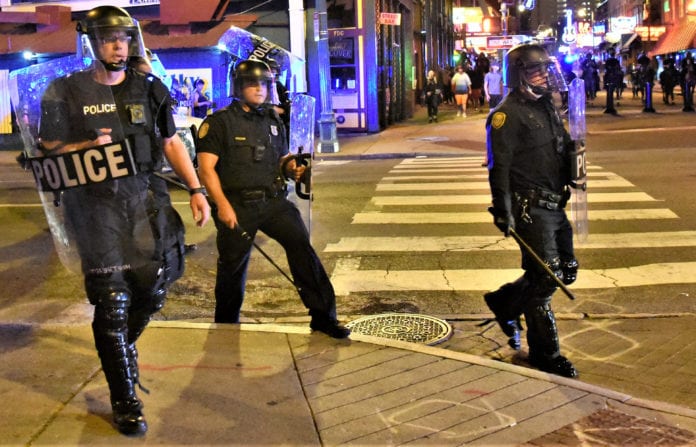by Mesha Crump —
Public safety as we recognize it stands to be forever changed as protests in close to 150 American cities ignited in response to the killing of George Floyd at the hands of Minneapolis police officer Derek Chauvin.

Communities, activists, city leaders, social justice organizations and police departments represent groups that are making their stance heard on how systemic and structural racism perpetuates recurring police violence against African Americans.
Many themes, although not new responses to fatal police encounters, gain momentum as we approach week two of protests: defund the police; 8Can’t Wait; fund Black opportunities. Without context, it is assumed that injustice fighters want to completely shut down police operations but that is not the case.
It’s two things: shaving the police budget and redistributing funds to open better and equitable pathways for African-American people; and investigate policies, patterns and practice.
While today’s demands are not new calls to action, Memphis city leaders seem to be cooperating with requests to examine the current culture, strategies and priorities of the Memphis Police Department (MPD).
In the past week, city leaders have demonstrated efforts in response to demands: Mayor Strickland signed a recent pledge presented by President Obama calling to:
- Review police use of force policies.
- Engage communities by including a diverse range of input, experiences, and stories in the review.
- Report the findings of the review to the community and seek feedback.
- Reform the community’s police use of force policies.
Of these calls, Mayor Strickland appears to be starting with engaging community input as this week begins a series of discussions to address and act on the over-policing of African Americans in Memphis.
Council members JB Smiley Jr., Michalyn Easter-Thomas and Martavious Jones jointly submitted a resolution that was advanced by the city council requesting that MPD and the Shelby County Sheriff’s Department adopt the “8 Can’t Wait” use-of-force reduction policy. Introduced by Campaign Zero to bring immediate change to police departments, 8 Can’t Wait operates a database that tracks a department’s adoption of the eight policies.

Memphis has enacted three of the policies: require warning before shooting; exhaust all alternatives before shooting; establish use of force continuum. According to Campaign Zero’s data, enacting all eight policies could reduce police killings by 72 percent.
Going beyond political participation to begin a process to develop better policies, transparency and accountability for policing in Memphis, understanding how we remain here rallying the demand that “Black Lives Matter” is a more essential part of this movement.
In America, political administrations respond to cracks in the social foundation with more force – twice as much, actually. City budgets are an indication of priorities and year to year, Memphis continues to increase its spend on police services – the most funded division with $282 million proposed for fiscal year 2021.
As the call to defund the police grows louder, it is apparent that those calls want funds and resources invested in African-American communities to close gaps in economic security, education and ownership.
African-American people are the majority population in Memphis yet experience poverty at 28.9% earning a median household income of $31,729 while whites make up 12.3% of poverty with a median household income of $59,507. The rate of African-American homeownership is reported as the lowest among the 50 largest cities in the U.S.
The City of Memphis allocates $0 in funding to education.
What these statistics reveal, as they always have, is that inequity is systemic and keeps African-American people at an extreme disadvantage by not creating legitimate access to the economy.
When another African-American person dies due to police negligence, it is another stinging demonstration that African-American lives don’t deserve equality in civil liberties. To make moves to investigate police practices is a step in a direction but without acknowledging how racism is equally embedded in housing, jobs and wages will keep African-American people here, fighting for fairness and justice.
Pushing African-American people to the margins and divesting in their communities is the underpinning of this current global demonstration and constant struggle. Solving injustice that has plagued African-American people in America requires an interrogation of how racism permeates through every part of African-American life, including education, economic prosperity and ownership.
When organizers, supporters, activists, and civil rights organizations urge that Black Lives Matter, it includes every part of the African-American experience.
The time is now for city leadership and citizens at every level of engagement to acknowledge the need for a model to advance Memphis and maintain momentum that does not leave the majority of African-American residents outpaced, undervalued and without fair access or representation to generate sustainable opportunities for themselves, their families or communities.
(A believer in and native of Memphis, Mesha Crump has spent most of her career serving mission-driven organizations in Memphis and New York City. Now a freelance contributor for The New Tri-State Defender, Mesha owns a social impact communications firm.)



